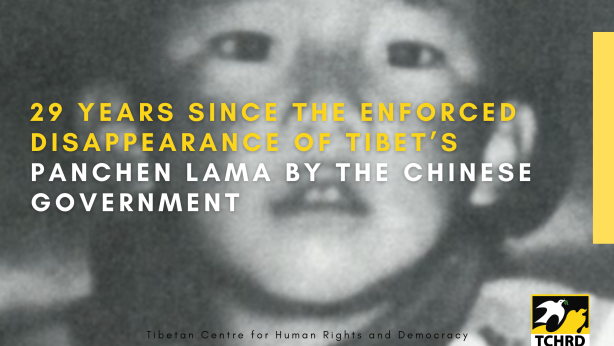China restricts freedom of movement of Tibetans ahead of Dalai Lama’s teachings
 Last week, Nepal police detained 41 Tibetan pilgrims at the Nepal-India border for travelling without valid documents. The Tibetans were apprehended at Dhangadi, 10 km from the India border while they were on their way to attend a major religious teaching in India. After being detained by the Nepal government authorities including the Department of Immigration for three days, they were released. Among them, 39 had travelled from Tibet on Chinese passports and two were India-based Tibetan refugees.
Last week, Nepal police detained 41 Tibetan pilgrims at the Nepal-India border for travelling without valid documents. The Tibetans were apprehended at Dhangadi, 10 km from the India border while they were on their way to attend a major religious teaching in India. After being detained by the Nepal government authorities including the Department of Immigration for three days, they were released. Among them, 39 had travelled from Tibet on Chinese passports and two were India-based Tibetan refugees.
The detention of Tibetan pilgrims by Nepal authorities is the latest in a series of hardships reported by a number of Tibetans inside Tibet whose freedom of movement is increasingly restricted by the Chinese authorities as they try to travel to India to attend the Kalachakra teachings. The Tibetan spiritual leader His Holiness the Dalai Lama will give the teachings from 3 to 14 January 2017 at the Buddhist pilgrimage site of Bodh Gaya in northern Indian state of Bihar.
The Kathmandu-based human rights NGO HURON informed TCHRD on 17 November that the Dhangadi city police on 16 November detained the 41Tibetans for two hours and then handed them over to the immigration department of Kailali district. The Kailali immigration officers in turn sent the Tibetans to the Department of Immigration in Kathmandu. HURON learned that the 39 Tibetan pilgrims had travelled to Nepal on Chinese passports but chose not to apply for Indian visas for their onward journey to India for fear of reprisals from the Chinese government. In a written communication to TCHRD, HURON staff wrote, “If the Chinese authorities saw Indian visas on their passports, then they could be jailed for six months to five years upon their return to Tibet.”
Despite requests from HURON to release the Tibetan pilgrims, on the evening of 15 November, 24 Tibetans, all male, were sent to the Dilibazar Sadakhor detention centre while the remaining 17 female Tibetans were kept in the custody of the Department of Immigration. The next evening, Chinese embassy officials were called in to verify the passports of the 39 pilgrims after which they were released. Following the verification of their documents by the Indian embassy officials, the two Tibetans holding Indian Registration Certificates were released the day after.
In the past decade, the Nepal government has come under extreme pressure from the Chinese government to adopt stricter attitude towards fleeing Tibetan refugees or those already settled in Nepal. The Chinese government spends a large sum on securing the Nepal-Tibet border to prevent Tibetans from travelling to Nepal, once considered for Tibetan refugees travelling to India for education, pilgrimage or to get blessings from the Dalai Lama.
In 2012, hundreds of Tibetans who had travelled from Tibet to India to attend the Kalachakra teachings were detained and interrogated by the Chinese authorities upon their return home. For weeks and months, Tibetans from all age groups some as old as 80 years old were forced to attend ‘patriotic re-education’ classes because their minds ‘had become corrupt by attending Kalachakra teachings.’
In April 2012, months after the Kalachakra teachings, the government of Tibetan Autonomous Region issued ‘guiding opinions’ on implementing passport regulations that impose substantial restrictions on the ability of Tibetans to obtain passports, which are necessary for international travel.
As the date for Kalachakra teachings nears, local Chinese authorities in Tibet have launched a major crackdown on Tibetans with valid passports fearing that they will travel to India. Sources informed TCHRD that Tibetans living Ngaba (Ch: Aba) County in Sichuan Province were told not to travel abroad before February 2017 although they have valid passports. Those who had made booked their travel tickets were ordered to cancel their trips. A considerable number of Tibetan pilgrims who arrived in India a month or several weeks ago are being asked to return back by 20 December 2016.
In some areas, local government officials have confiscated valid passports from Tibetans who wished to travel abroad. A lay Tibetan man was forced to hand over his passport to the government after being warned by local authorities that failing to submit his passport would get him blacklisted in Machu (Ch: Maqu) County in Gansu Province. “I had a passport with five years validity and was planning to travel this winter. But the township officials and village heads asked me to hand it over immediately. They said if I did not, I would get blacklisted and excluded from all government welfare schemes in future.” Some Tibetans in Ngaba County were asked to return their passports or they will be barred from travelling abroad for life.
Tibetans who had been issued passports had been warned against visiting India. Some were given strict deadlines to return no later than in November and December to prevent them from attending the Kalachakra teachings.
The Tibetan Centre for Human Rights and Democracy (TCHRD) is appalled by the restrictions placed on the right to freedom of movement of the Tibetan people. The right to freedom of movement is guaranteed in Article 13 of Universal Declaration of Human Rights: “Everyone has the right to freedom of movement and residence within the borders of each state.” And “everyone has the right to leave any country, including his own, and to return to his country.” Article 12(2) of the International Covenant on Civil and Political Right (ICCPR), which is binding on China as part of customary international law, also recognises that everyone has the right to freedom of movement, including the right leave their country.
In its authoritative interpretation of this right, the Human Rights Committee’s General Comment 27 states that international travel cannot be restricted because of the purpose or duration of the travel. The right to freedom of movement may only be restricted in exceptional circumstances when the restriction is necessary to protect national security, public order, public health or morals and the rights and freedoms of others. The restrictions imposed by the Chinese authorities on the Tibetans is unjustifiable and unwarranted, and therefore, arbitrary and discriminatory.
TCHRD fears that the 39 Tibetans whose identities are known to Chinese authorities via its embassy in Nepal will likely get punished upon their return to Tibet. The possibility of imprisonment for six months to five years, if true, is particularly disturbing given that these Tibetans were forced to travel without their passports to India because they were threatened with punishment by the Chinese authorities against travelling to India. It demonstrates the extent to which the right to freedom of movement of Tibetans are violated outside the borders of the People’s Republic of China (PRC). The violation of the right to freedom of movement in turn violates a host of other rights, particularly the right to to freedom of religion and belief, in the case of the countless Tibetans who are barred from attending the Kalachakra teachings, one of the most important religious ceremonies for Tibetan Buddhists. TCHRD calls on the Chinese authorities to refrain from acts of reprisals against Tibetan pilgrims particularly the 39 Tibetans whose names are as follow: Tsering Tashi, Jamyang Sangdon,Gangkyi Genor, Yangbhum Gyal, Siling Gyangtse, Tabho, Pabho, Jamyang Gesar, Tsetan Dorjee, Pabhe, Jampa, Sonam, Lhamo Gyal, Tadrin Gyal, Dorjee, Ono, Chinshey Tsering, Choedak Gyaltsen, Gendun Gyatso, Talho, Gyabho, Kanyen Dolma, Tsering Kyi, Mena, Sangmo, Angkyir, Trangkor, Kunchok Kyab, Phagmo Dolma, Langtso Dolma, Jamyang Tso, Tsering Dolma, Khoenke, Dhonkho, Dadon Tso, Ado, Dorjee Yonten, Yama Lhamo and Bhulo.


